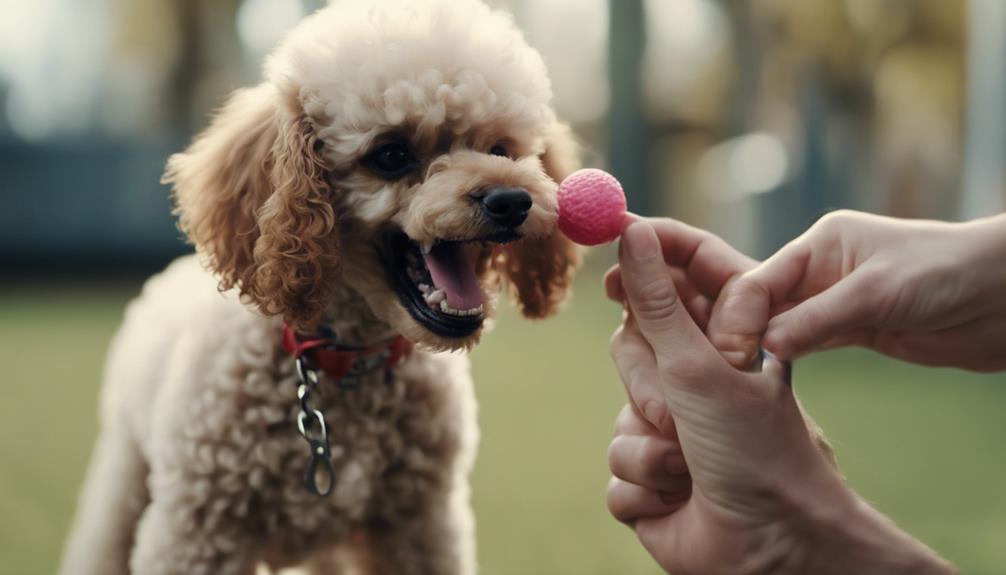Imagine navigating through the playful yet nippy nature of your Poodle puppy, akin to untangling a knot with care and patience. Understanding the underlying reasons behind this behavior is crucial in shaping a well-mannered companion. You'll discover practical tips and expert insights on how to address and diminish Poodle puppy biting tendencies, paving the way for a harmonious relationship with your furry friend.
Key Takeaways
- Identify triggers like teething and fear for poodle puppy biting.
- Use chew toys and gentle bite training to redirect biting behavior.
- Socialize puppies to reduce fear-based biting tendencies.
- Seek professional guidance for tailored solutions to manage biting habits.
Understanding Poodle Puppy Biting Behavior
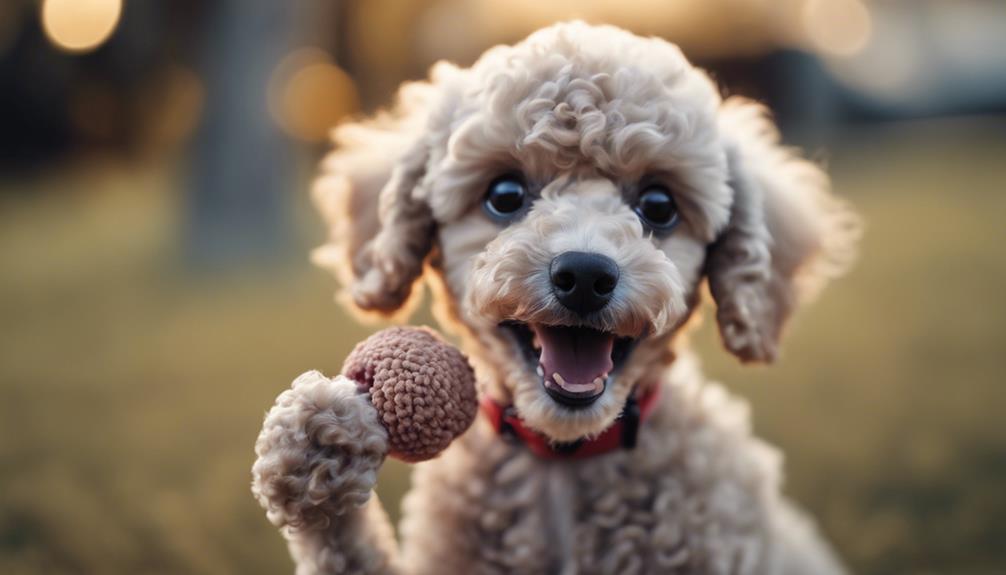
Understanding the behavior of Poodle puppy biting is essential for effectively addressing and modifying this common canine behavior. Poodle puppy biting can be influenced by various factors such as teething, exploration, play instincts, fear, and uncertainty. Identifying the specific trigger for the biting is crucial for intervening appropriately. To reduce biting behavior in Poodle puppies, utilizing chew toys, implementing bite inhibition training, and encouraging socialization are key strategies. When addressing Poodle puppy biting, it is important to consider the root cause of the behavior to tailor training techniques for behavioral improvement. Consistent training, positive reinforcement, and setting clear boundaries are essential components in addressing Poodle puppy biting behavior effectively. By providing appropriate chew toys, positively reinforcing good behavior, and engaging in structured training sessions, you can help your Poodle puppy learn appropriate biting habits and develop into a well-behaved companion.
Importance of Chew Toys
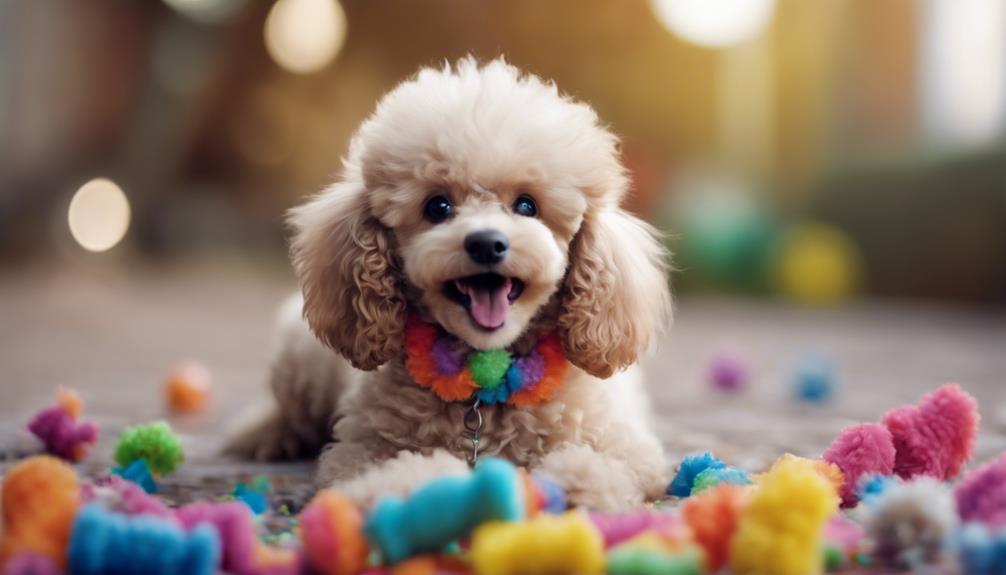
Chew toys play a crucial role in addressing teething discomfort and encouraging healthy chewing habits in Poodle puppies. Here's why they are essential:
- Teething Relief: Chew toys provide a soothing sensation on a Poodle puppy's gums, helping to alleviate the discomfort associated with teething.
- Prevention of Boredom: Offering a variety of chew toys keeps your puppy engaged, reducing the likelihood of boredom-induced chewing on inappropriate items.
- Mental Stimulation: Chew toys offer mental stimulation, keeping your Poodle puppy's mind active and preventing destructive behaviors like chewing on furniture or hands.
- Behavioral Redirection: Providing appropriate chew toys gives your puppy an outlet for their natural chewing instincts, redirecting their biting behavior towards acceptable objects.
Early Bite Inhibition Training
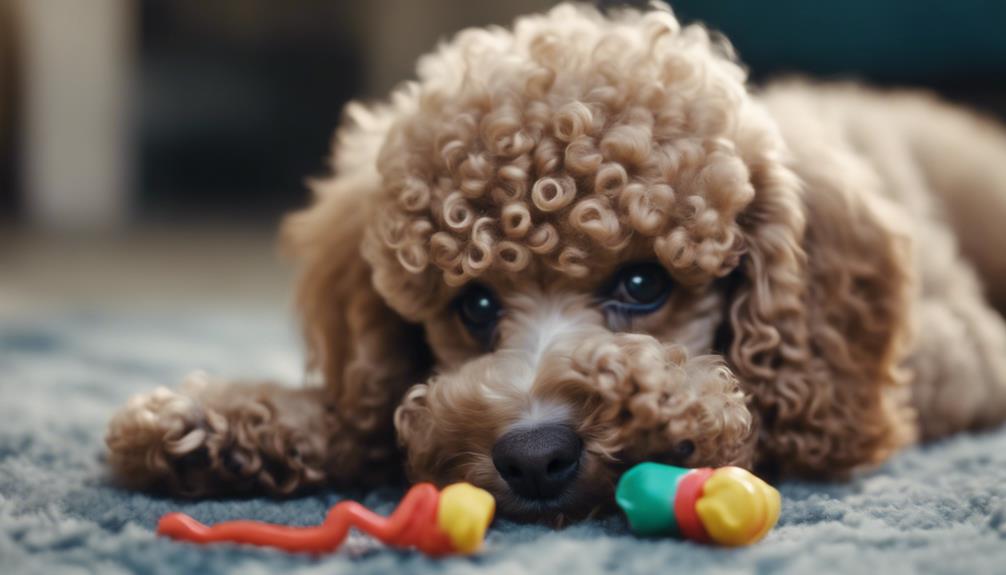
When initiating early bite inhibition training for your Poodle puppy, focus on encouraging gentle bites, maintaining a consistent training approach, and practicing patience and persistence. Teaching your puppy to control the force of their bite through these methods can help establish appropriate mouth manners during play and social interactions. Remember, consistent feedback and reinforcement play a crucial role in shaping your puppy's behavior and preventing future biting issues.
Gentle Bite Encouragement
To effectively train early bite inhibition in Poodle puppies, consistent reinforcement of gentle biting behavior is crucial for shaping appropriate adult behavior. This process involves encouraging the puppy to control the force of its bites through positive interactions. Here are four key strategies to foster gentle bite encouragement:
- Use high-pitched yelps: Mimic the sound of a hurt littermate to signal to the puppy that the bite was too hard.
- Stop play immediately: Cease playtime whenever the puppy bites too forcefully to teach consequences.
- Offer a suitable chew toy: Redirect the biting behavior towards an appropriate toy for the puppy to chew on.
- Reward gentle bites: Praise the puppy and give treats when it exhibits soft and controlled biting.
Consistent Training Approach
Consistently reinforcing positive behaviors through early bite inhibition training is essential for fostering appropriate bite control in Poodle puppies. By establishing clear boundaries and consistently reacting to undesirable biting behavior, you can effectively teach your puppy how to moderate its bite force. This approach mimics the way puppies learn from their littermates, encouraging gentle play and bite control. Starting early with this training method is crucial, as it sets the foundation for a well-behaved and non-aggressive adult Poodle. Consistent training from an early age helps in reducing biting incidents and ensures that your puppy grows up with the necessary skills for appropriate interaction. Utilizing a structured training approach is key to developing proper bite inhibition in your Poodle.
| Early Bite Inhibition Training |
|---|
| Establish boundaries |
| Reinforce gentle behavior |
| Consistent training methods |
Patience and Persistence
Have you ever wondered why patience and persistence are crucial elements in early bite inhibition training for Poodle puppies? When training your Poodle puppy to control their biting behavior, it is essential to exhibit patience and consistency. Here are four key aspects to consider:
- Repetition: Practice bite inhibition training regularly to reinforce positive behaviors.
- Positive Reinforcement: Reward your Poodle puppy for gentle play and redirect any excessive biting.
- Consistency: Maintain a consistent approach to teaching your puppy appropriate biting behavior.
- Time: Understand that learning bite inhibition takes time and requires ongoing guidance.
Consistency in Training Methods
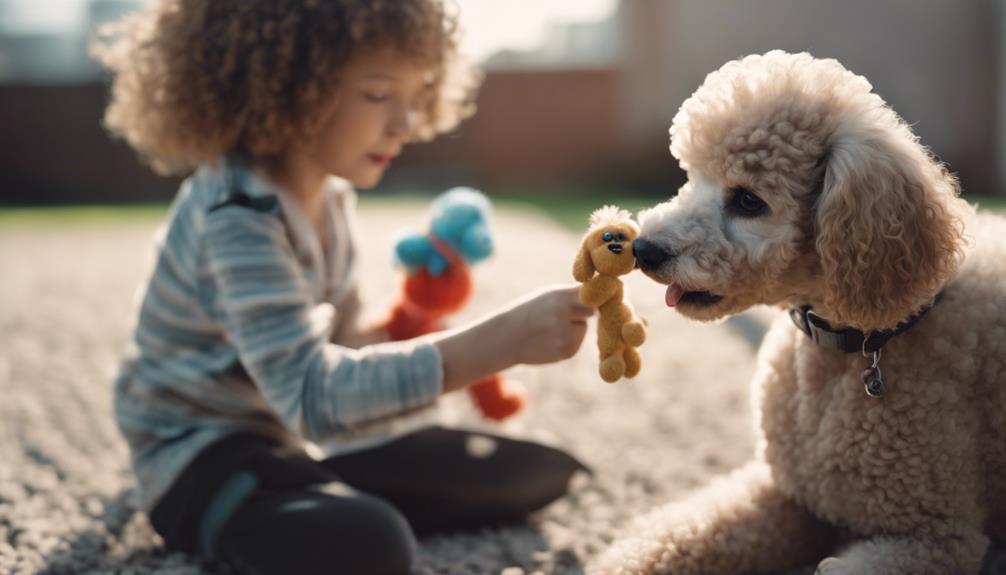
Using a consistent training approach when addressing poodle puppy biting behavior is crucial for effective communication and behavior modification. Consistency in training methods helps establish clear expectations for your Poodle puppy. It ensures all family members respond similarly to biting incidents, reducing confusion for the puppy. Clear and consistent messages are essential for effective training and behavior modification. Avoiding mixed signals and maintaining consistency can expedite the training process. Consistency in reinforcement of desired behaviors is key to shaping your Poodle puppy's behavior. By using a clear and consistent training method, you provide your puppy with a structured environment that aids in learning appropriate behaviors. Remember, consistency is not only beneficial for the puppy but also for everyone involved in the training process. It is the cornerstone of successful behavior modification and fosters a harmonious relationship between you and your furry companion.
Significance of Socialization
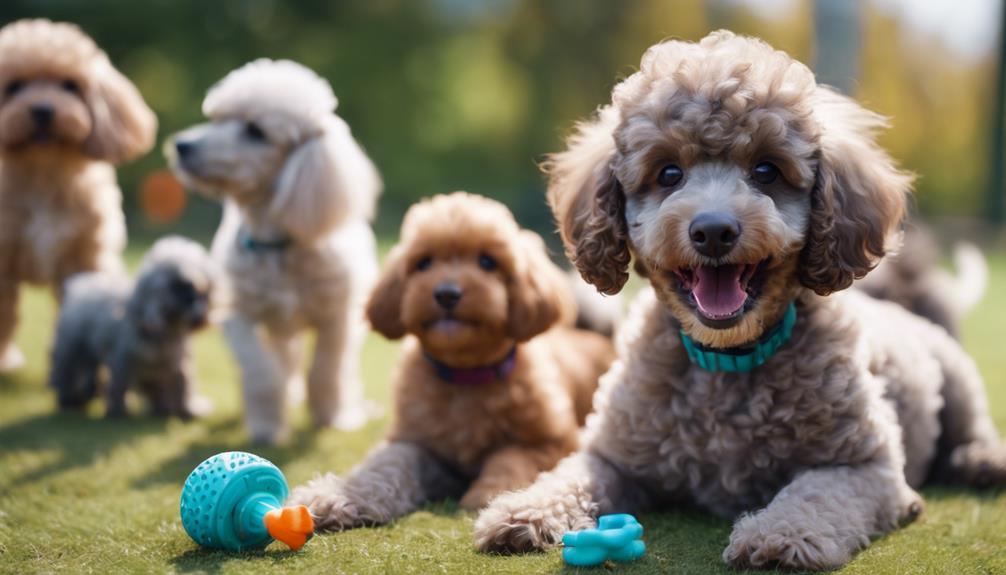
To ensure your poodle puppy develops appropriate behavior and confidence, understanding the significance of socialization is paramount. Socialization plays a crucial role in reducing biting tendencies and fostering positive behavior in your poodle puppy. Here are four key points to consider:
- Learning Appropriate Behavior: Socialization helps poodle puppies learn how to interact appropriately with people and other animals, reducing the likelihood of aggressive behaviors like biting.
- Reducing Fear-Based Biting: Proper socialization can reduce fear-based biting tendencies in poodles, helping them feel more comfortable and secure in various situations.
- Building Confidence: Well-socialized poodle puppies tend to be more confident and balanced, exhibiting better behavior and temperament in different environments.
- Exposure to Various Stimuli: Introducing your puppy to different sounds, experiences, and stimuli during socialization can help decrease biting behavior, as it helps them become familiar and comfortable with various situations.
Constructive Play Techniques
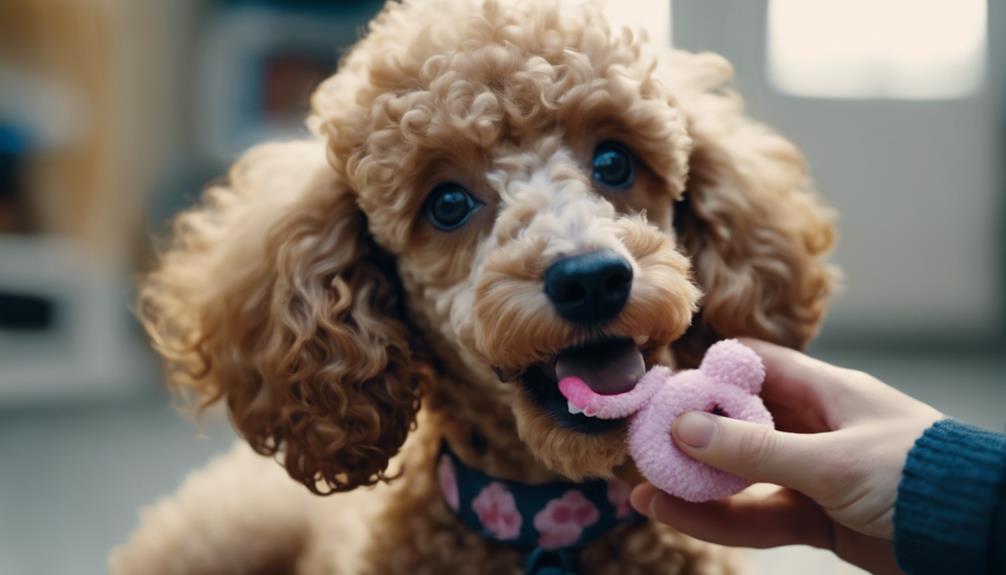
When addressing Poodle puppy biting behavior, employing constructive play techniques can be highly effective. Redirecting the puppy's attention towards appropriate toys not only discourages biting but also encourages gentle play interactions. By providing a variety of engaging toys, you can help your Poodle puppy expend energy in a positive and non-destructive manner.
Redirecting Biting Behavior
Redirect biting behavior in poodle puppies towards appropriate chew toys to prevent damage and encourage constructive play habits. When implementing this technique, consider the following:
- Offer a variety of textures and shapes in chew toys to keep the puppy engaged.
- Use interactive toys that dispense treats as a positive association with redirecting biting behavior.
- Engage in play sessions with the puppy to model appropriate chewing habits.
- Seek guidance from a professional dog trainer to tailor redirection strategies to your puppy's specific needs.
Consistently redirecting your poodle puppy's biting behavior to toys will help establish good habits and prevent destructive chewing tendencies. Remember to praise and reward the puppy when they choose the toy over inappropriate items to reinforce positive behavior.
Encouraging Gentle Play
Encouraging gentle play in poodle puppies involves mimicking interactions with littermates to teach bite control and promote softer interactions during play sessions. Utilize high-pitched yelps or 'ouch' cues to indicate when biting becomes too forceful, encouraging the puppy to adjust its bite pressure. Providing appropriate chew toys and redirecting biting behavior towards these toys helps reinforce positive chewing habits. Consistent training on gentle play aids in developing bite inhibition and establishing boundaries for acceptable behavior. Clear rules for constructive play should be set to ensure the puppy learns to interact gently with people and other pets. By employing these techniques, you can effectively encourage gentle play, promote bite inhibition, and foster positive play interactions with your poodle puppy.
Implementing the Time-Out Strategy
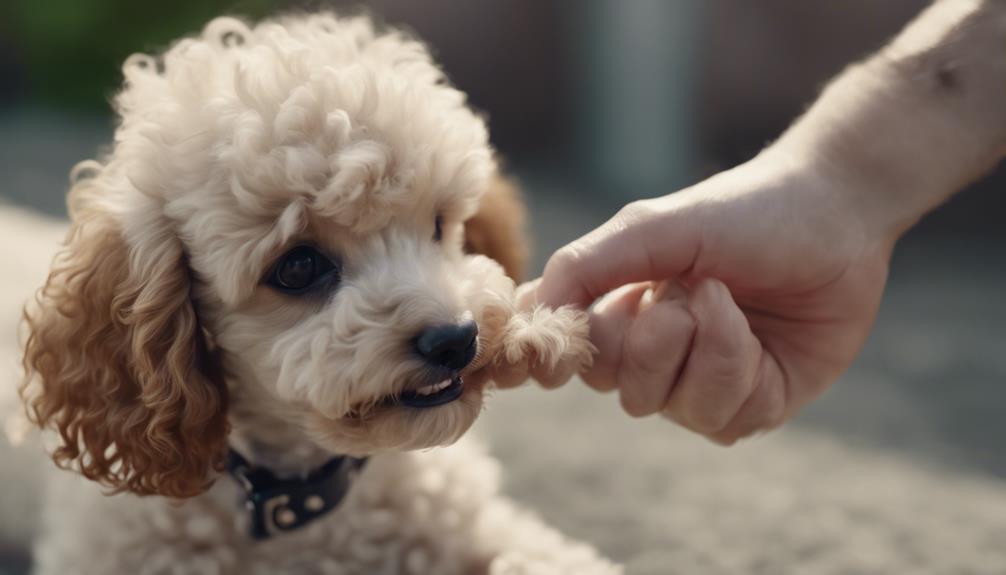
To effectively address poodle puppy biting behavior, implementing the time-out strategy is a crucial step in communicating consequences and setting boundaries. When teaching your poodle about the time-out strategy, remember these key points:
- Keep it brief: Time-outs should last around 30 seconds to a minute to effectively convey the message that biting behavior is not acceptable.
- Designated area: Use a specific spot like a bathroom or a quiet room for time-outs to separate the puppy from the situation where the biting occurred.
- Avoid crate: Refrain from using the crate for time-outs to prevent negative associations with their safe space and ensure the puppy sees the time-out as a consequence for their actions.
- Consistency is key: Implement time-outs consistently for biting incidents. Consistency reinforces the message that biting is unacceptable and helps the puppy understand the consequences of their actions.
Reinforcing Positive Behaviors
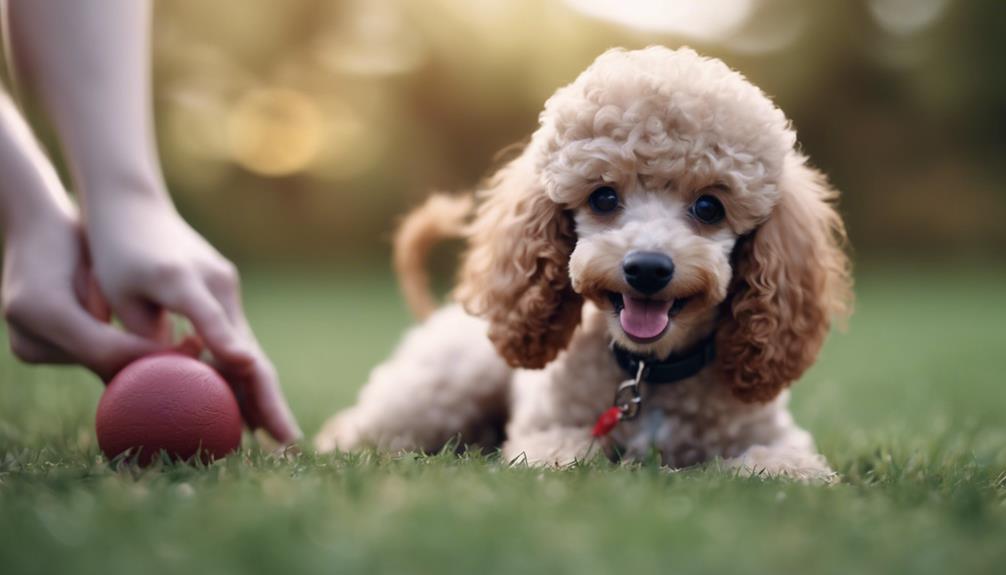
Rewarding Poodle puppies' desired behaviors with treats or praise is a key strategy for reinforcing positive actions and shaping their responses. Utilizing positive reinforcement techniques helps in establishing a strong connection between good behavior and rewards, ultimately reducing the likelihood of biting incidents. Clicker training can be particularly effective in marking and rewarding desirable behaviors promptly. Consistency in applying positive reinforcement is essential for your Poodle puppy to understand what behaviors are encouraged. By encouraging calm and gentle interactions through positive reinforcement, you can foster a respectful and trusting relationship with your furry companion. Here is a table to illustrate the benefits of reinforcing positive behaviors in Poodle puppies:
| Benefits of Positive Reinforcement in Poodles |
|---|
| Creates strong association with good behavior |
| Encourages calm and gentle interactions |
| Builds trust and respect with your puppy |
| Reduces likelihood of biting incidents |
| Shapes desired responses effectively |
Seeking Professional Guidance
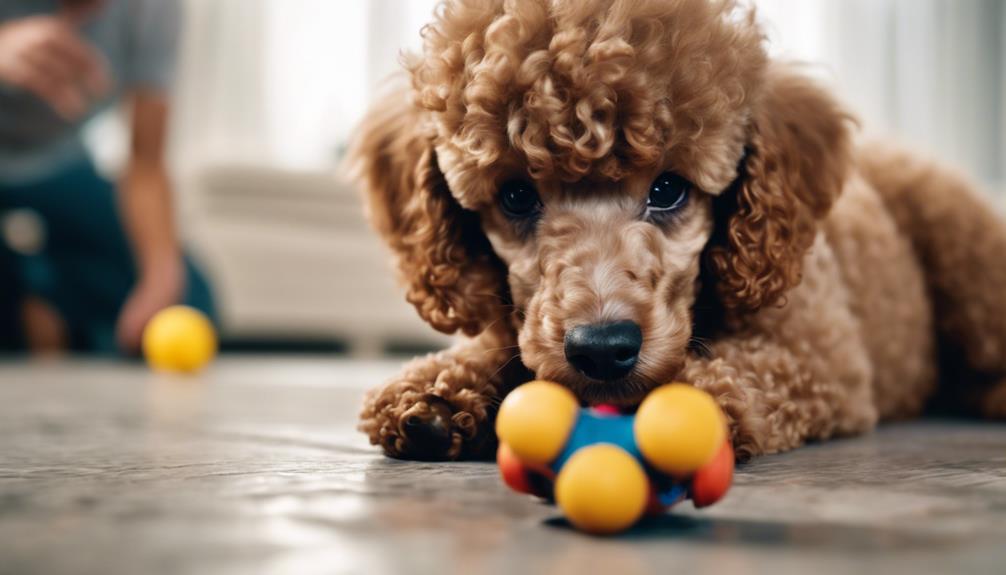
To address poodle puppy biting behavior effectively, seeking guidance from certified dog trainers and behaviorists can provide tailored solutions based on individual needs and circumstances. Here's why consulting these professionals is crucial:
- Expertise: Dog trainers and behaviorists have extensive knowledge and experience in dealing with various behavioral issues in dogs, including biting tendencies.
- Customized Approach: Through behavioral assessments, professionals can identify the root causes of your poodle puppy's biting behavior and create personalized training plans to address them effectively.
- Structured Learning: Obedience classes offer a controlled environment where your puppy can learn appropriate behaviors and socialize with other dogs under the guidance of experienced trainers.
- Tailored Solutions: Collaborating with professionals allows for the development of specific strategies to manage and reduce biting behaviors in your poodle puppy, leading to a harmonious relationship between you and your pet.
Seeking guidance from dog trainers and behaviorists ensures that you receive expert advice and support in addressing your poodle puppy's biting behavior effectively.
Utilizing Online Dog Training Courses

Online dog training courses offer interactive training modules that allow you to learn and practice techniques at your own pace. Virtual trainer assistance ensures you receive guidance tailored to your poodle's biting behavior. These tailored training exercises can help address and reduce your poodle puppy's biting tendencies effectively.
Interactive Training Modules
Utilizing interactive training modules through online dog training courses can significantly enhance your understanding and skills in addressing poodle puppy biting behavior. These modules offer a structured approach to behavior modification, guiding you through the process of identifying and rectifying biting habits in poodles. Here are four key benefits of utilizing interactive training modules for poodle behavior modification:
- Tailored Guidance: Receive step-by-step instructions on understanding the root causes of biting behavior.
- Effective Strategies: Implement proven techniques to reduce and eliminate biting habits in your poodle puppy.
- Interactive Elements: Access video demonstrations and quizzes to enhance your learning experience.
- Personalized Feedback: Receive tailored advice and guidance to address your poodle's specific biting behavior effectively.
Virtual Trainer Assistance
Enhance your understanding and skills in addressing poodle puppy biting behavior by tapping into the resources offered through virtual trainer assistance in online dog training courses. These courses provide convenient options for learning effective training techniques such as bite inhibition and positive reinforcement. Virtual trainers guide you through step-by-step demonstrations, interactive lessons, and video tutorials, allowing you to grasp concepts at your own pace. By accessing virtual trainer assistance, you can receive support and guidance from anywhere, enabling you to implement strategies to reduce poodle puppy biting effectively. Online courses cover essential topics like socialization, ensuring a comprehensive approach to addressing your puppy's behavior. Take advantage of these resources to develop a strong foundation in training your poodle.
Tailored Training Exercises
Tailored training exercises in online dog training programs offer structured methods for addressing and modifying poodle puppy biting behavior effectively. Online courses provide step-by-step instructions and demonstrations on training poodles, focusing on bite inhibition, redirection techniques, and positive reinforcement. Utilizing online platforms allows owners to learn at their own pace and practice these exercises with their poodle puppies in a comfortable environment. These courses cater to various learning styles and offer support from experienced trainers to help reduce biting behavior. By engaging in these tailored training exercises through online courses, you can effectively address and modify your poodle puppy's biting behavior, creating a harmonious bond between you and your furry companion.
Effective Obedience Training Options
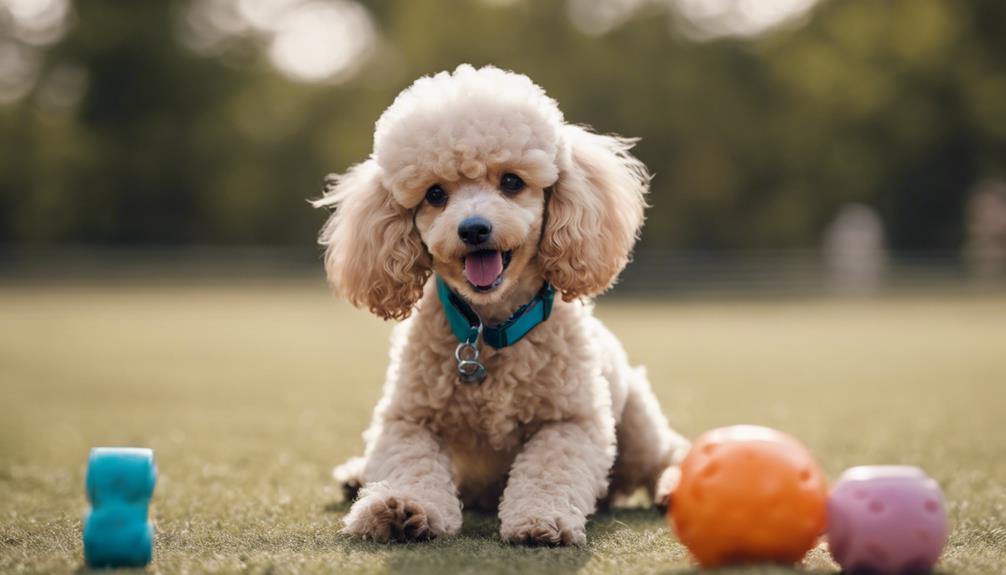
Obedience training plays a crucial role in shaping the behavior of Poodle puppies by establishing clear boundaries and reinforcing desired actions. Basic obedience commands such as sit, stay, and come are fundamental in teaching your puppy self-control and reducing unwanted behaviors like biting. Consistent training sessions are key to developing good habits, as they create a routine that fosters communication between you and your puppy. Positive reinforcement during obedience training, such as treats or praise, not only motivates your puppy but also strengthens the bond and respect between both of you.
When conducting obedience training with your Poodle puppy, remember to keep the sessions short and engaging to maintain their focus. Use positive reinforcement techniques to reward good behavior promptly. Incorporating play and affection into the training sessions can make learning fun for your puppy while still being effective. By implementing these effective obedience training options, you can guide your Poodle puppy towards well-mannered behavior and reduce biting tendencies.
Exploring Dog Training Masterclasses
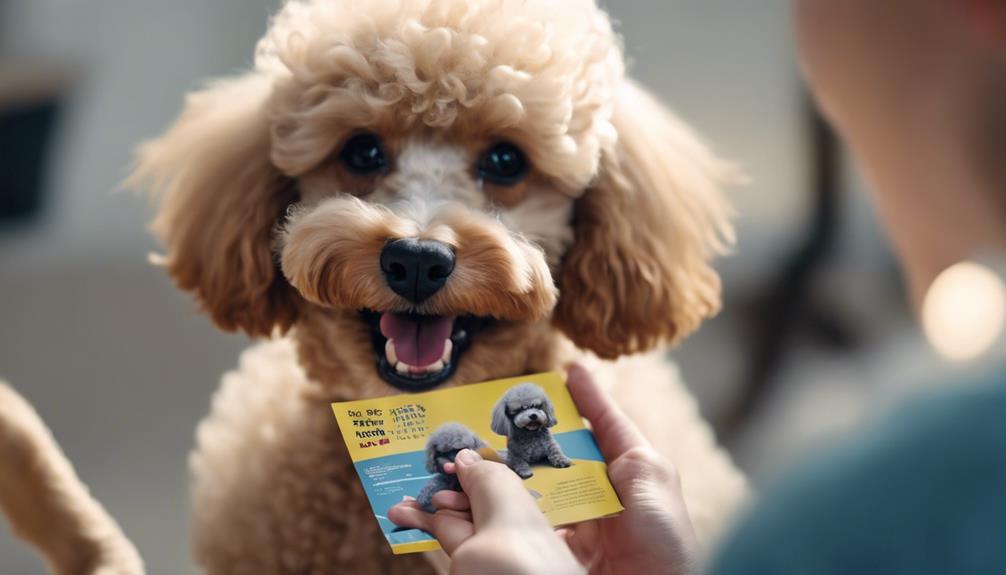
To further address and modify poodle puppy biting behavior, exploring dog training masterclasses can provide structured guidance on understanding the root causes and implementing effective training techniques. These classes offer a comprehensive approach to tackling biting issues in poodle puppies through positive reinforcement and specialized training methods. Here are four key benefits of enrolling in dog training masterclasses:
- In-depth Insights: Gain a deeper understanding of the reasons behind poodle puppy biting behavior, helping you tailor your training approach accordingly.
- Structured Guidance: Receive step-by-step instructions on how to address and modify biting tendencies in a systematic manner.
- Effective Techniques: Learn proven training strategies that focus on positive reinforcement, bite inhibition training, and socialization for long-term behavioral improvement.
- Empowerment: Equip yourself with the knowledge and skills needed to effectively manage and redirect poodle puppy biting, fostering a healthier relationship between you and your furry companion.
Longevity and Health of Poodles
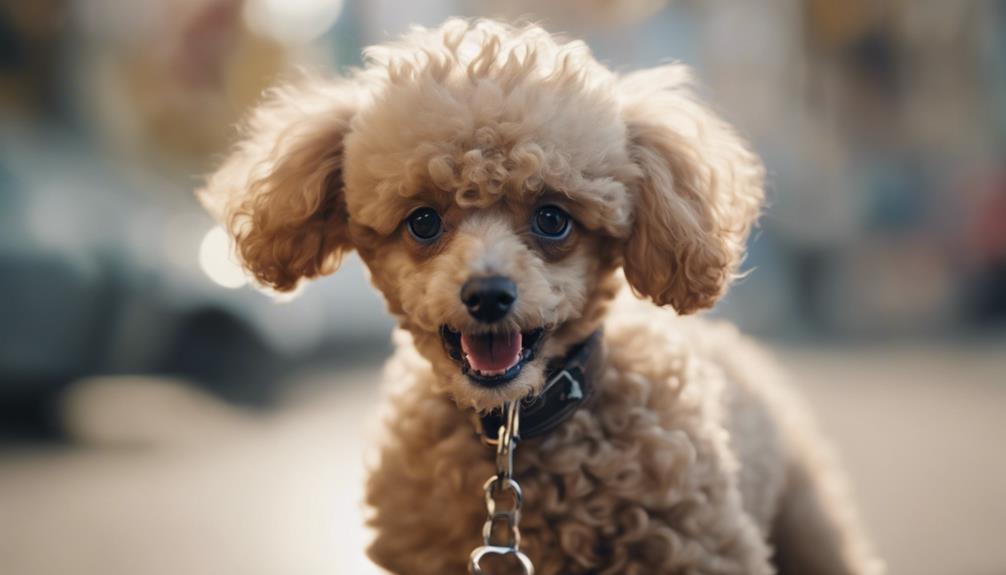
For Poodles, maintaining longevity and health requires consistent attention to exercise, nutrition, grooming, and veterinary care. Poodles typically live 12-15 years, indicating their potential for a long life span. Regular exercise and mental stimulation are crucial for keeping Poodles healthy and happy. Daily walks, playtime, and interactive toys can help prevent obesity and promote cardiovascular health. Proper nutrition is equally vital, as Poodles are prone to health issues like hip dysplasia, progressive retinal atrophy, and skin allergies. Monitoring their weight and providing a balanced diet can mitigate these risks. Additionally, grooming is essential for Poodles, especially due to their curly coat. Regular brushing and trimming not only maintain their appearance but also prevent matting and skin problems. Lastly, dental health and mental stimulation should not be overlooked. Providing chew toys, puzzles, and interactive games can keep Poodles mentally sharp and enrich their lives, contributing to their overall well-being and longevity.
Frequently Asked Questions
How Do I Get My Standard Poodle Puppy to Stop Biting?
To stop your Standard Poodle puppy from biting, try teething solutions with chew toys, use positive reinforcement to teach bite inhibition, and consistently redirect their behavior. Socialize them well and seek professional help if needed.
At What Age Do Poodle Puppies Stop Biting?
Around 6-8 months, poodle puppies typically stop biting. The teething process usually ends by 6 months, reducing the urge to bite. Consistent training, socialization, positive reinforcement, and redirection techniques can speed up behavior modification.
How Do I Get My Puppy to Calm Down and Stop Biting?
To help your puppy calm down and stop biting, try puppy training techniques like redirection, positive reinforcement, and consistent playtime. Engage in socialization, provide teething toys, and maintain consistency in training routines for effective results.
Why Is My Puppy Biting Me Aggressively and How Do You Stop It?
To stop your puppy's aggressive biting, understand their behavior, use proper training techniques, and redirect their aggression towards chew toys. Consistent positive reinforcement is crucial. Seek guidance from professionals to tailor solutions for your Poodle puppy's biting behavior.
Conclusion
In conclusion, by providing your Poodle puppy with chew toys, teaching bite inhibition, promoting socialization, and maintaining consistency in training, you can effectively reduce biting behavior. Imagine a happy, well-behaved Poodle companion, free from the discomfort of teething and the urge to bite. With dedication and patience, you can shape your puppy into a confident and obedient companion for years to come.
